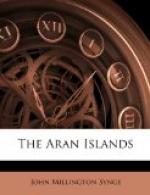Soon afterwards bands of girls—of all ages from five to twenty-five—begin to troop down to the schoolhouse in their reddest Sunday petticoats. It is remarkable that these young women are willing to spend their one afternoon of freedom in laborious studies of orthography for no reason but a vague reverence for the Gaelic. It is true that they owe this reverence, or most of it, to the influence of some recent visitors, yet the fact that they feel such an influence so keenly is itself of interest.
In the older generation that did not come under the influence of the recent language movement, I do not see any particular affection for Gaelic. Whenever they are able, they speak English to their children, to render them more capable of making their way in life. Even the young men sometimes say to me—
’There’s very hard English on you, and I wish to God I had the like of it.’
The women are the great conservative force in this matter of the language. They learn a little English in school and from their parents, but they rarely have occasion to speak with any one who is not a native of the islands, so their knowledge of the foreign tongue remains rudimentary. In my cottage I have never heard a word of English from the women except when they were speaking to the pigs or to the dogs, or when the girl was reading a letter in English. Women, however, with a more assertive temperament, who have had, apparently, the same opportunities, often attain a considerable fluency, as is the case with one, a relative of the old woman of the house, who often visits here.
In the boys’ school, where I sometimes look in, the children surprise me by their knowledge of English, though they always speak in Irish among themselves. The school itself is a comfortless building in a terribly bleak position. In cold weather the children arrive in the morning with a sod of turf tied up with their books, a simple toll which keeps the fire well supplied, yet, I believe, a more modern method is soon to be introduced.
I am in the north island again, looking out with a singular sensation to the cliffs across the sound. It is hard to believe that those hovels I can just see in the south are filled with people whose lives have the strange quality that is found in the oldest poetry and legend. Compared with them the falling off that has come with the increased prosperity of this island is full of discouragement. The charm which the people over there share with the birds and flowers has been replaced here by the anxiety of men who are eager for gain. The eyes and expression are different, though the faces are the same, and even the children here seem to have an indefinable modern quality that is absent from the men of Inishmaan.
My voyage from the middle island was wild. The morning was so stormy, that in ordinary circumstances I would not have attempted the passage, but as I had arranged to travel with a curagh that was coming over for the Parish Priest—who is to hold stations on Inishmaan—I did not like to draw back.




